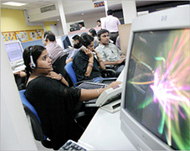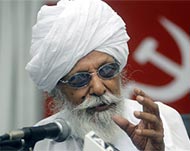Strike paralyses Indian airports, banks
Hundreds of thousands of bank workers and airport staff across India have stayed away from work to protest against economic reforms in a strike led by the ruling coalition’s communist allies.

Airlines cancelled or rescheduled flights, shutters were down at state-run bank branches and trading volumes on India’s currency and bond markets fell to a trickle on Thursday.
The national strike disrupted flights as state workers staged a one-day protest over moves to liberalise Asia’s fourth-largest economy.
Television station NDTV said some 40 million workers had joined the strike, matching the prediction of MK Pandhe, president of the trade union group Citu who on Thursday described the response as “unprecedented”.
Union leaders said the massive stay-away was the first step in a fight against Prime Minister Manmohan Singh, who has allowed the majority sell-off of state-owned firms and airports and eased rules on foreign investment.
Testing moment
“This will be just a warning for the government,” said Pandhe. “Unless the government undertakes a comprehensive review of its policies, we will call for a much bigger action – we may go for longer strikes.”
It was the first nationwide strike called by India’s unions since Singh was elected last year, and comes after the government last month decided to sell 74% stakes in New Delhi and Mumbai international airports.
 |
|
Liberalisation has provided the |
The air force deployed some 3000 personnel at 29 major airports, an official said, as some 20,000 airport employees joined the strike which caused havoc in parts of the country.
In Kolkata, the capital of communist-ruled West Bengal state once known as Calcutta, public transport was brought to a standstill and factories, offices and schools remained shut in protest against government plans for privatisation, bank mergers and foreign investment in pension funds and airports.
In Mumbai, India’s financial hub once known as Bombay, about a thousand bank workers carrying union placards marched from branch to branch shouting “Down with bank mergers!” and “Down with the government!”
The strike has been called by the United Forum of Bank Unions, which represents nearly 95% of more than 1.3 million bank and insurance workers.
Merger debate
India has about 300 banks led by State Bank of India and the Congress party-led government wants some of the public-sector ones to merge and become more competitive, but the unions say fewer bigger banks would not necessarily lead to strength.
CH Venkatachalam, general secretary at the All India Bank Employees’ Association, said: “The strike is successful. No cash transactions are taking place, no clearing activities are done.”
|
“Unless the government undertakes a comprehensive review of its policies, we will call for a much bigger action -we may go for longer strikes” MK Pandhe, |
Private sector and foreign banks, which do not have many staff in trade unions, were functioning although some said cash counters were closed. Stock market trading was normal.
The ruling coalition, which swept to power unexpectedly in May 2004, relies on union-backed communist parties for support but the left are against greater foreign control of areas like banking.
In August, the coalition abandoned plans to sell stakes in state-run firms to strategic investors due to pressure from the left, which fears massive jobs losses among its core voters.
Analysts said Thursday’s strike was a muscle-flexing exercise by the communist leaders of the trade union.
Riot police
“The communists to a great extent have come in the way of reforms and they will continue to do so,” said Saumitra Chaudhuri, economic adviser with domestic rating agency ICRA.
In New Delhi, riot police were monitoring dozens of striking airport employees who gathered outside the domestic terminal shouting slogans against federal Aviation Minister Praful Patel.
 |
|
Communists provide key support |
“Down, down, down with Praful Patel,” they shouted. The government, which runs India’s airports, said the strike was having minimal impact and the Airports Authority of India (AAI) said international flights were operating as normal.
“The morning roster staff have all reported for duty,” an AAI spokesman said. “But some airlines have cancelled or combined their services to match demand with capacity.”
Airlines such as Jet Airways Ltd and state-run Indian Airlines rescheduled and restricted internal flights and unions said the strike was crippling services in most of the 78 airports with facilities for commercial flights.
Privatisation
“The strike is a 100 percent success,” said MK Ghosal, general-secretary of the Airports Authority of India Employees Union.
“They (the government) have deployed some air force and navy personnel … it is not a normal situation.”
Unions are protesting against government plans to set up two joint ventures to operate Mumbai and New Delhi airports. The government is offering 74% stakes in both.
 |
|
Police guard Mumbai airport on |
Foreign firms can hold up to 49% while private Indian firms must have at least 25%. The authorities have received 11 bids.
In New Delhi’s dilapidated domestic terminal, Manjeet Singh Puri, an airport employee for the last 20 years, said he was against privatisation.
“If they want to build better airports, then why can we not do it?” he said. “Is the airport not already world-class?”
Singh’s government, seeking to walk a tightrope between pro-poor and pro-investment policies, has said economic reforms are key to boosting growth and paying for its ambitious social welfare plans.
Reform retreat
Economists say growth, now running at 7%, must rise to lift more than one quarter of India’s one billion-plus population out of poverty.
But the government has had to retreat on some reforms in the face of opposition from its communist backers, including plans to sell strategic stakes in over a dozen state firms.
The unions have put forward 16 demands that include halting stake sales in profitable state firms, opposing foreign investment, tightening.